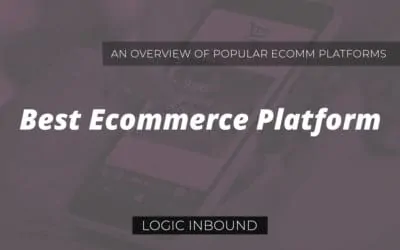If you are building your e-commerce site on WooCommerce you can drastically improve the amount of site traffic and visitors you see by improving your SEO, or search engine optimization. SEO is an art as much as a science, so there is no one simple way to get it right. When it comes to WooCommerce, you need to consider not just the site itself but also the fact that it exists on WordPress, which has its own peculiarities when it comes to SEO.
At Logic Inbound, we understand the ins and outs of SEO regardless of what platform your e-commerce site lives on. There are some best practices we apply across the board when working with clients to improve their SEO and some particulars we know need to be applied specifically to WooCommerce and the WordPress platform.
Read on to learn about WooCommerce and SEO, as well as find tools for SEO and tips for improving your search engine optimization.
Then, when you’re ready to get started on your site’s SEO, contact us to learn about options and ways we can help. If you’re looking to develop an SEO department inside your company, then it would be wise to read our tips on When it’s better to just train SEO in house
What is WooCommerce?
WooCommerce is a platform for building an e-commerce website. It distinguishes itself from popular platforms like Shopify and BigCommerce by acting as a plugin for WordPress. This means you have to also know something about WordPress in order to use WooCommerce, but both platforms are very accessible for the average user.
Once you get WooCommerce, you download it as a plugin to add to your WordPress account. From there, you can use WooCommerce themes to customize your e-commerce website. There are also a range of plugins available for WooCommerce, some of which can be helpful for improving website SEO.
Overall, WooCommerce is an easy-to-use and highly customizable platform that is great for people starting out in SEO and e-commerce. It is a great platform for small businesses all the way up to large online merchants. Since launching in 2011, it has been picked up by more than 380,000 online retailers, making it one of the most popular e-commerce platforms available.
What is SEO?
SEO is an acronym for search engine optimization. As the name suggests, it’s simply the process of optimizing various parts of your website so that you can show up more prominently in Google searches.
Why is this important? These days, customers find most of what they want through organic Google searches. Even when looking for a physical, local business, many people start with a Google search in order to narrow down their hunt. The businesses and websites that are on the top of the first page of Google results receive a tremendous boost in traffic, which can often translate directly into increased sales.
Because of the incredible potential, more and more businesses are starting to take SEO seriously as a key component of running their businesses, both online and at brick and mortar locations. That has also led to a slew of tools and tricks for monitoring and improving SEO.
At Logic Inbound, we are experts in SEO. We can help any business of any size improve their search ranking in order to gain more customers and online sales. Discover how to get started with us today.
SEO Tools
There are tons of tools available that are related to SEO. Many of them come right from Google, including:
- Google Adwords
- Google Trends
- Google Analytics Solutions
- Google Surveys
- Google Content Experiments
- Google Search Console
- Google Alerts
These tools from Google can analyze your traffic, see how long people are spending on various website pages and send you alerts for keywords related to your business. They can also test out different versions of pages for you and show global trends around keywords.
The right tools will depend on your particular needs. For example, if you have multiple ideas for your homepage and just don’t know which one to pick, Google Content Experiments will be a tremendously helpful SEO tool for you, as it can allow you to run multiple versions of a page and analyze which version draws the most visitors, keeps them on your website the longest and produces the most click-throughs.
However, if you are starting at the beginning and just need to learn about keywords in order to set the direction of your SEO strategy, a tool like Google Trends or Google Alerts may be better suited to your needs. These tools are both based on keywords. They can show you the types of things people are searching for online and emerging trends. This is great for choosing keywords to build content around and measuring your website’s content against other sites’ content.
Most businesses can benefit from using Google Analytics Solutions. This SEO tool has become a standard in the industry. It can show you a tremendous amount of information about your website, keywords and trends online. Google Analytics is what many major businesses rely on in order to build their SEO content strategy and design their websites. The tool can give you a comprehensive view of what people are doing when they come to your website and how you can improve your SEO to encourage them to stick around.
When it comes to WooCommerce, there is even a Google Analytics plugin that you can add to your WooCommerce site. This makes it super easy to use Google Analytics to get an in depth look at your SEO and website performance.
SEO Services
Doing SEO on your own isn’t for everyone, however. Logic Inbound offers SEO services for those who want help or simply don’t have time to implement a comprehensive SEO strategy across their entire website. Our SEO process is built around the following factors:
- Discovery: We spend time learning about your business, customers and website. We feel that by better understanding who you are and who your customers are, we can implement and more meaningful SEO strategy.
- Growth Analysis: We target places where your business and customer base can grow.
- Keyword Research: We research the keywords that are appropriate for your business, as well as the keywords that your competitors are using successfully. Keywords are the core of an SEO strategy, so researching and understanding them is crucial to your success.
- Optimization for Relevance: SEO isn’t just a list of random words. Good SEO hinges on relevance. We will research the keywords that are most relevant to your brand in order to get you the right kind of website traffic. You will be more successful at bringing in customers if you appeal to the right people from the start.
- Authority Building: Part of appealing to the right customers is positioning yourself as an expert. We know you’re already an expert in topics related to your business; the trick is to show the rest of the world your expertise. This comes through creating high-quality content that is related to your business and that can convince Google that you are an authoritative source of information.
- Reporting: We believe in our results. That’s why we will report to you on a regular basis with hard data that shows increases in website traffic and improvements in SEO that have real impacts for your website and business.
Google SEO
You might be wondering at this point why SEO is so focused on Google in particular. Since the search engine launched, it quickly became the number one source of information on the internet. Today, it is still overwhelmingly the search engine of choice for most people on the internet. Whether they are casual searchers or people looking for highly specialized information, nearly every internet search runs through Google.
Because of that, it is absolutely essential that SEO targets Google search results in particular. We have crafted a strategy that focuses on ways to improve search ranking specifically within Google because we understand what an important platform it is for e-commerce businesses.
WordPress SEO
Due to the unique setup of WooCommerce, WordPress SEO is an additional concern when building an SEO strategy. It isn’t enough to optimize for WooCommerce or websites in general; to be successful with WooCommerce as an e-commerce platform, you must also optimize for WordPress’s SEO options.
At Logic Inbound, we frequently use WordPress ourselves and understand the best ways use WordPress for SEO. Our strategies focus on the WordPress platform itself and the features built right into it for SEO.
For example, we mention above that keyword research is part of our SEO process. When it comes to WordPress, this keyword research not only informs the content of articles, but also the content of the “snippet” section of WordPress. The “snippet” is a particular feature of WordPress that can be very helpful in the context of SEO. If you know the proper ways to optimize that snippet, you can dramatically improve your overall SEO.
That is just one example of how we work with WordPress to improve SEO for WooCommerce websites and other businesses that rely on WordPress. We also have many other strategies we use for SEO implementation.
WooCommerce Shortcodes for SEO
Beyond relying on WordPress, another distinctive feature of WooCommerce is its use of shortcodes. Some of the shortcodes and plugins you can use for WooCommerce can also improve your SEO.
Using shortcodes for SEO takes a little creativity, but we have a few suggestions:
- Best_selling: This shortcode retrieves the best selling products on your site. This is useful for sales data, but have you considered using it for SEO as well? Knowing what is selling best on your site can be tremendously useful for keyword research.
- Product attributes: You can use the shortcode “attribute” to display products based on a common feature. For example, if you run a clothing store, you could display all the products with the attribute “summer.” This is useful from an SEO perspective because it is an easy and quick way to tailor your pages to keyword trends. As the seasons change and “summer clothes” becomes and more and more popular keyword search in Google, the ability to quickly change your store to meet this new demand can result in a lot of new business.
- Related_products: This shortcode displays a list of related products when a user is viewing one particular item. This provides a way to chain keywords together and move people through your website. If they land on your website for the keyword “summer clothes,” then click on a t-shirt, related products that show things like sunglasses and sunblock can give them new keywords to also look for in your website.
There are many more shortcodes possible in WooCommerce. You can learn about them all here. Using them effectively to improve your SEO is partly a matter of knowledge and partly a matter of creativity. If you think of SEO as an overall strategy that touches all aspects of your e-commerce business, however, you can find success here.
Local SEO
Finally, a word about location and SEO.
We often think of SEO as a concern of the internet and disconnected people all over the world, but even customers searching for products in Google are still very connected to their local communities and stores that are physically near them. It may surprise you to learn that many of the people searching for products online use keywords that include the name of the city where they live. They want to find a physical store near them, if that is possible.
Whether you have a physical location or not, therefore, making your SEO local is important for your success. Build content that is relevant to your local area, even if you don’t operate a brick and mortar business in that region or at all. Even things like keyword usage can change from one place to the next. People in New York might search for “summer clothes” slightly differently than people in Houston. Maintaining an awareness of differences between local regions will prevent you from missing out on business you otherwise should be able to reach.
Learn more about how Logic Inbound can work with you on improving SEO no matter where you’re located by checking out our services today.





0 Comments